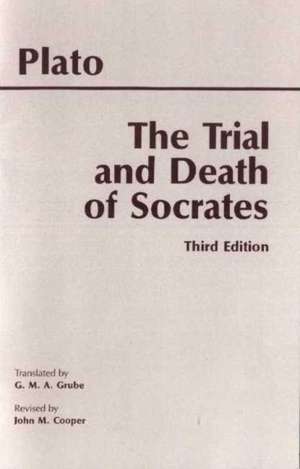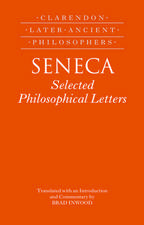The Trial and Death of Socrates: Euthyphro, Apology, Crito, death scene from Phaedo
Autor Plato Traducere de G. M. A. Grube Revizuit de John M. Cooperen Limba Engleză Paperback – 30 noi 2000
| Toate formatele și edițiile | Preț | Express |
|---|---|---|
| Paperback (13) | 33.01 lei 3-5 săpt. | |
| Dover Publications – 31 ian 1992 | 33.01 lei 3-5 săpt. | |
| Hackett Publishing Company – 30 noi 2000 | 58.17 lei 3-5 săpt. | +7.72 lei 7-13 zile |
| – | 62.35 lei 3-5 săpt. | |
| www.bnpublishing.com – 6 mar 2012 | 78.92 lei 3-5 săpt. | |
| CREATESPACE – | 164.03 lei 3-5 săpt. | |
| AZILOTH BOOKS – 6 noi 2016 | 65.15 lei 6-8 săpt. | |
| Lulu.Com – 16 aug 2019 | 72.98 lei 6-8 săpt. | |
| Lulu.Com – 14 aug 2020 | 74.73 lei 6-8 săpt. | |
| Lulu.Com – 29 aug 2017 | 102.20 lei 6-8 săpt. | |
| Indoeuropeanpublishing.com – 30 iun 2009 | 105.03 lei 6-8 săpt. | |
| Bibliotech Press – 31 aug 2011 | 108.78 lei 6-8 săpt. | |
| Bibliotech Press – 17 iul 2018 | 120.54 lei 6-8 săpt. | |
| Kessinger Publishing – 10 dec 2008 | 260.73 lei 38-44 zile | |
| Hardback (5) | 166.71 lei 6-8 săpt. | |
| Hackett Publishing Company – dec 2000 | 173.19 lei 3-5 săpt. | |
| Lulu.Com – 14 aug 2020 | 166.71 lei 6-8 săpt. | |
| Lulu.Com – 28 aug 2017 | 185.17 lei 6-8 săpt. | |
| Lulu.Com – 16 aug 2019 | 208.71 lei 6-8 săpt. | |
| Bibliotech Press – 17 iul 2018 | 209.50 lei 6-8 săpt. |
Preț: 58.17 lei
Preț vechi: 64.03 lei
-9% Nou
Puncte Express: 87
Preț estimativ în valută:
11.14€ • 11.62$ • 9.33£
11.14€ • 11.62$ • 9.33£
Carte disponibilă
Livrare economică 19 februarie-05 martie
Livrare express 05-11 februarie pentru 17.71 lei
Preluare comenzi: 021 569.72.76
Specificații
ISBN-13: 9780872205543
ISBN-10: 0872205541
Pagini: 64
Dimensiuni: 9 x 215 x 5 mm
Greutate: 0.05 kg
Ediția:3 Rev ed.
Editura: Hackett Publishing Company
Colecția Hackett Publishing Company, Inc (US)
ISBN-10: 0872205541
Pagini: 64
Dimensiuni: 9 x 215 x 5 mm
Greutate: 0.05 kg
Ediția:3 Rev ed.
Editura: Hackett Publishing Company
Colecția Hackett Publishing Company, Inc (US)
Descriere
Descriere de la o altă ediție sau format:
Among the most important and influential philosophical works in Western thought: "Euthyphro, " exploring the concepts and aims of piety and religion; "Apology, " a defense of the integrity of Socrates' teachings; "Crito, " exploring Socrates' refusal to flee his death sentence; and "Phaedo, " in which Socrates embraces death and discusses the immortality of the soul.
Among the most important and influential philosophical works in Western thought: "Euthyphro, " exploring the concepts and aims of piety and religion; "Apology, " a defense of the integrity of Socrates' teachings; "Crito, " exploring Socrates' refusal to flee his death sentence; and "Phaedo, " in which Socrates embraces death and discusses the immortality of the soul.
Notă biografică
Plato was an ancient Greek philosopher born in Athens during the Classical period in Ancient Greece. In Athens, Plato founded the Academy, a philosophical school where he taught the philosophical doctrines that would later become known as Platonism. Plato (or Platon) was a pen name derived, apparently, from the nickname given to him by his wrestling coach - allegedly a reference to his physical broadness. According to Alexander of Miletus quoted by Diogenes of Sinope his actual name was Aristocles, son of Ariston, of the deme Collytus (Collytus being a district of Athens).Plato was an innovator of the written dialogue and dialectic forms in philosophy. He raised problems for what later became all the major areas of both theoretical philosophy and practical philosophy. His most famous contribution is the Theory of forms, which has been interpreted as advancing a solution to what is now known as the problem of universals. He is also the namesake of Platonic love and the Platonic solids.His own most decisive philosophical influences are usually thought to have been, along with Socrates, the pre-Socratics Pythagoras, Heraclitus, and Parmenides, although few of his predecessors' works remain extant and much of what we know about these figures today derives from Plato himself.[a]Along with his teacher, Socrates, and his student, Aristotle, Plato is a central figure in the history of philosophy.[b] Unlike the work of nearly all of his contemporaries, Plato's entire body of work is believed to have survived intact for over 2,400 years.[6] Although their popularity has fluctuated, Plato's works have consistently been read and studied. Through Neoplatonism Plato also greatly influenced both Christian and Islamic philosophy (through e.g. Al-Farabi). In modern times, Alfred North Whitehead famously said: "the safest general characterization of the European philosophical tradition is that it consists of a series of footnotes to Plato.























